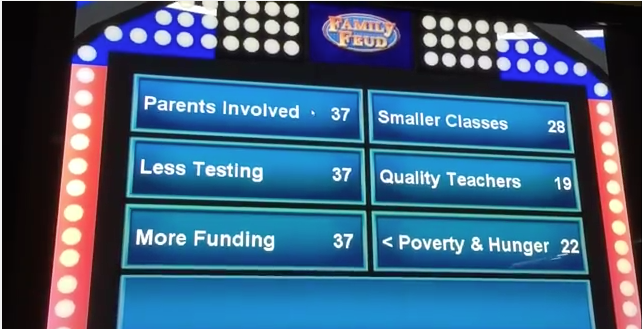Parent Trigger is a one-way street to non-democratic, private control of our public schools.
During the last round of Parent Trigger law attempts, I wrote about it in the posts Parent trigger laws: Wolves in sheep’s clothing and astroturfing and The Teat: Where does parent trigger movement get their $?
I flew to Texas Tuesday to testify at the Texas House of Representatives Public Education Committee against SB14— the latest Parent Trigger bill in Texas. I don’t recommend 5 a.m. flights two days in a row. I left for Texas on at 5 a.m. and returned to California the next day at 5 a.m. I still feel punch drunk.
I have included a YouTube video of the ~8 minute testimony below. The video also includes 4 questions (Reps Farney, Allen and Gonzales) from members of the House Public Education Committee after I completed my testimony. Here is a transcript:
My name is Julian Vasquez Heilig. I am a Professor of Education Policy and Leadership Studies at California State University Sacramento. Prior to being appointed as Professor at Cal State, I was on faculty in the College of Education at the University of Texas at Austin for 8 years.
I will publish my testimony on my education policy blog Cloaking Inequity.
I am testifying against SB14. I do not represent my institution on this bill.
My research studies have focused on a variety of issues including community-based reform and also market-based reforms.
The current research on parent trigger suggests that we should have major concerns about SB 14
SB14 is parent empowerment without the empowerment. Parental involvement without the involvement.
Why? Students and parents rights are actually more limited. Once the petition goes forward, the rights that are currently guaranteed to parents, students and teachers under the democratically defined education code are squelched. Under private control, parents and students no longer have guarantees on class size limits, disciplinary decisions, or qualified teachers among others.
As the Houston preacher just said, “parents deserve to have a say.”
Furthermore, as my real estate agent recently told me “Location!, Location!, Location!” I understand why there is great interest in parent trigger. Schools are sitting on very valuable parcels of land in Austin, in Houston, in Dallas.
It would be a coup for those shopping for real estate and facilities if just a few parents from any particular year are given the reins to easily transfer hundreds of millions of dollars in public assets. Let’s do some quick math.
Originally the SB14 Parent Trigger bill would have impacted more than 200 schools. Based on changes to the bill in the Senate, estimates that I have heard are that this would probably now impact 60 schools per year. Let’s estimate those schools are worth $3-5 million each in terms of property and buildings.
A few thousand parents could move $300 million in property resources out of the public space! Thus, Parent Trigger as written in SB14 is a one-way easy street.
My understanding from attorneys that I have talked to today is that it’s a grey area whether Texas could get the buildings back. Specifically, related issues have been litigated in Ohio and elsewhere.
Parent Revolution likes to talk about California. Turns out Californians don’t like the idea of giving away their schools for free. Parent Trigger has been boondoggle in terms of implementation and student achievement in California. Californians have realized parents trigger sounds good in theory, but in practice has been a failure. It’s a California export best left on the shelf.
Furthermore, the bill is flawed, as parents should have the option to cancel the contract and return to public management if they so choose. We know from the research literature that more than 80% of charters perform no better than traditional public schools.
Parent Trigger shouldn’t be a one-way street. Families should also be able to make the choice to leave private control and return to public control if they are underwhelmed by the undemocratic, non-local, control of their school.
I responded to a few questions from the Public Education Committee members after the testimony. In my response to the question from Rep. Allen, I mentioned a poll of voters and parents conducted by In the Public Interest. See a quick breakdown of the In the Public Interest survey of voters in the post School (False) Choice Sunday. (I promise it’s worth the click)
I did forget to mention in my testimony that one of the items prioritized by parents is more funding for schools at #3. You see the full parent choice poll at In the Public Interest.

I also mentioned that California is planning to spend $3,000 more per pupil in the fall from their billions in surplus. That should take the Golden State from 50th to about the national average.
In conclusion, currently Parent Trigger as formulated in SB14 and elsewhere is a bad idea for families and kids. It is a one-way street to private control. As I mentioned in my testimony, the recourse of parents is more limited under private control than democratic control.
I do have a new idea for parent trigger that would empower parents and communities. Stay tuned.
Please Facebook Like, Tweet, etc below and/or reblog to share this discussion with others.
Want to know about Cloaking Inequity’s freshly pressed conversations about educational policy? Click the “Follow blog by email” button in the upper left hand corner of this page.
Twitter: @ProfessorJVH
Click here for Vitae.
For all of Cloaking Inequity’s posts on Parent Trigger go here.
For all of Cloaking Inequity’s posts on charters go here.


First, thank you for your personal sacrifice on behalf of students and families in Texas for QUALITY public education. Second, I found the points you made against SB14 more than interesting. I found them compelling and clear. Policy makers should be vigiliant with the financial impact on public money and equally with the impact on the delivery of quality instruction. Well done, Dr. Heilig! I hope the lawmakers heard your clear message.
LikeLike